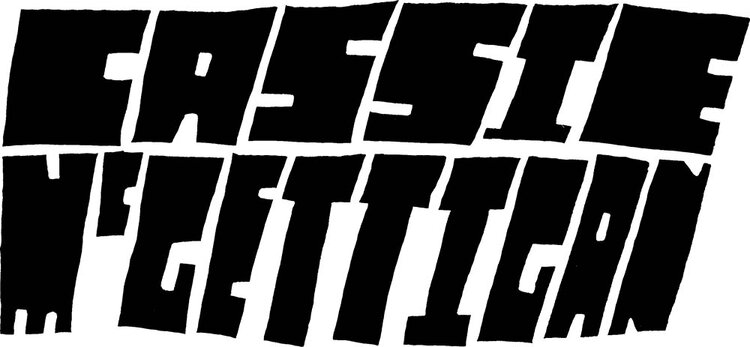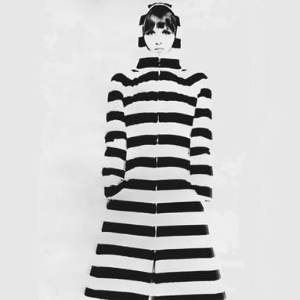Portrait of Vuokko by Juliana Harkki.
HER WORK
for Marimekko is what is best known by most. In 1953, the year she joined the company, she designed the stripe “Piccolo.” The print is comprised of one or two passes of stripes that can overlap to form a third color. This approach takes brilliant advantage of large-scale silkscreen printing, which she helped Marimekko to develop (and we now do, too). Smart minimalism and flexibility of design have been at the center of her work since.
Vuokko’s stripes were an immediate sensation. In 1956, Marimekko introduced the iconic Jokapoika (“Everyboy”) shirt as their first garment for men. Over the years, Vuokko has designed more than 300 colorways for “Piccolo” to be used for the shirts, from her original Mediterranean-inspired palette to black on white and everything in between.
On the right here is Armi Ratia, the founder of Marimekko, in the late 1960s, out playing the model in one of the zillions of Jokapoika striped shirts she made. She, like many ladies, had no trouble borrowing from the men’s department. Though “Piccolo” was also used for garments intended for women, such as the Kivijalkamekko dress, designed by Vuokko and shown here with Ilmari Tapiovaara’s egg sculpture in 1957.
Bouffanted visitors to scorched mediterranean locales who still always pack an umbrella, grumpy teenagers also expecting rain, kiddos–everybody!–got a great striped something.
Here is Vuokko completing an installation of Marimekko goods at a gallery in Stockholm, in heels, in 1958. Bang story!
Vuokko designed other patterns and shapes for Marimekko as well, including–I was surprised to learn–Iloinen takki, that dress with patch pockets that Marimekko first made in 1960 and still makes and adult women still wear. Vuokko intended the wee pockets to hold surprise gifts for the wearer’s beau, and that’s about the extent of adult sexiness I can imagine associated with this garment.
However, her signature spare, geometric style were evident from the beginning, as you can see in her split color wool blouse of 1956 and her Ritsa apron with “Raituli” stripes of 1959. And now, these are questionably sexy body obsfucating garments I can stand behind, absolutely.
In 1964, Vuokko left Marimekko to found her own company, Vuokko Oy, which she ran until 1988 and still runs a version of today. Left to her own devices, the body obliteration + spare geometry were turned up to full force and the vibe got super hot!
HER HOME
and office/studio in Helsinki was designed from top to bottom in 1970 by her late husband Antii Nurmesniemi (who also designed, for example, the Wärtsilä coffee pot for Arabia). It is open except for the bedroom with big views of the sea. Four mezzanines, including the swimming pool level which I have not seen a picture of but would love to see a picture of, stacks of Vuokko’s floor pillows and a heated floor = heavenplace.
HER DEAL
(those glasses)
Portrait with plants by Anna Huovinen.
RESOURCES
-We stock the Marimekko book at the shop, and it includes a bunch of images and information about Vuokko and Marimekko overall. It is, hands-down, the book we consult most when trying to forge through a new design.
–Apartamento ran a wonderful profile of Vuokko in Issue #07, featuring an interview with her and shots from her home, including the first two I posted in the series, and “I got rid of most of the seams and pleats. The Japanese say ‘Vuokko set women free.’ See, my design always starts from the fabric. I want to give the patterns a lot of solid surface, which often affects the shape of the final dress, loosening it up” and other gems. Track it down!
-Ebay.
This post originally appeared on the Gravel & Gold blog.





















